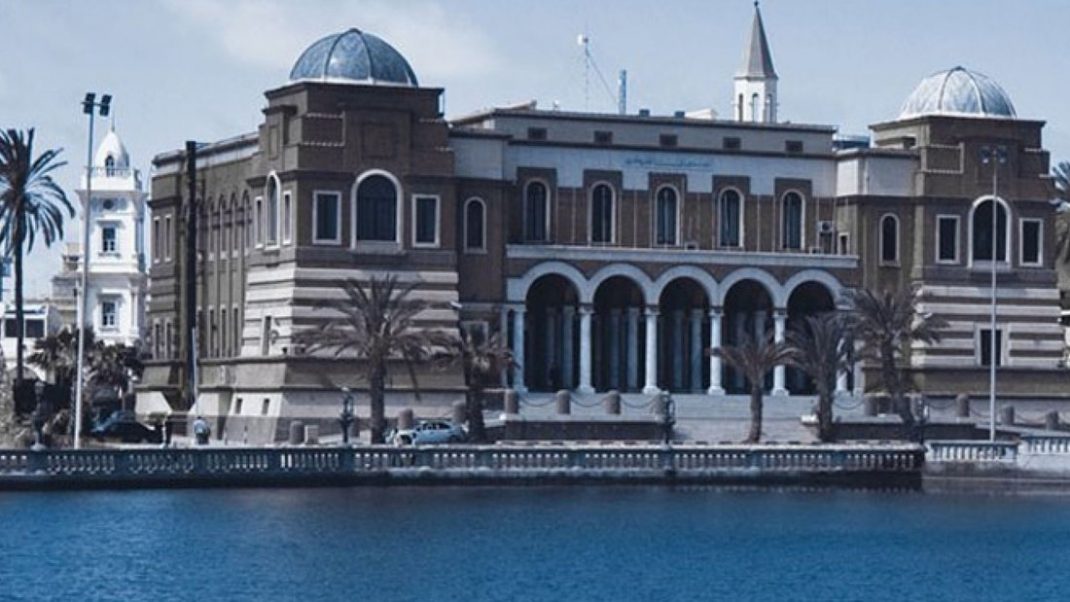By Saddek Elkaber
 In times of conflict, a central bank can play a unifying role. This is what is happening in Libya.
In times of conflict, a central bank can play a unifying role. This is what is happening in Libya.
The world’s central banks are back at the centre of global discussions around thorny issues ranging from negative interest yields to the impact of digital currencies on the future of the global banking sector.
Amid these discussions, advocates of decentralisation and deregulation question the very premise of central banking as an appropriate regulatory mechanism for the next stage of the global financial evolution.
The ongoing debate over the future of central banks, however, overlooks the critical role of a financial regulator in bringing security, stability and sobriety to places lacking such characteristics due to political or other crises.
There are many countries in the world where drawn-out military conflicts have debilitated state institutions and vital social and economic structures.
In these cases, responsible actions by a central bank can be the decisive factor in providing economic and financial strategies to provide basic livelihoods and protect national resources.
Libya is a prime example of a central bank confronted with such a challenge.
The country has been torn apart by bitter political divisions, leaving the Central Bank of Libya (CBL) with the difficult balancing act of supporting a fragile economy while remaining a neutral state actor for the benefit of Libyans across the entire country – with much of its work taking place in high-risk, conflict-laden scenarios.
The emergence in 2014 of a parallel government and parallel state institutions in Benghazi and Tripoli aggravated the already unstable political and economic environment in Libya that had taken root in the post-Gaddafi years.
These divisions, combined with a deteriorating security situation and plummeting oil prices, created extraordinary circumstances that required an expansion of the CBL mandate to preserve the state’s assets and ensure an uninterrupted, functioning Libyan economy.
Maintaining cohesion and continuity
The CBL had to shift its immediate priorities to safeguarding state reserves, supporting Libya’s vital state institutions and protecting the livelihoods of its citizens.
We also expended significant efforts to secure Libya’s assets abroad and to maintain a reliable network of international partners at a time when most foreign banks were exiting high-risk developing markets.
The CBL in Tripoli exclusively manages the flow of payments for oil sales by Libya’s National Oil Corporation. This process is transparent, facilitated by big international banks, and has not been interrupted by institutional fragmentation and political turmoil.
Despite immense pressures on our reserves due to the rising budget deficit between 2013 and 2017, the CBL maintained spending on vital sectors such as healthcare, education, transportation and utilities on a year-to-year basis. Similarly, we ensured uninterrupted payments of public salaries across all regions of Libya.
The CBL’s management has understood that preventing Libya’s collapse hinges on the state’s ability to provide basic services for all citizens and ensure the continuity of key, centralised state institutions — a task made all the more imperative by ongoing violent conflicts across the vast geography of the country.
Overcoming challenges
In 2014, the CBL faced a difficult test. A global fall in oil prices and frequent stoppages at Libya’s oil fields and ports dealt a heavy blow to oil revenues, which accounted for 95% of government revenues.
As revenues fell more than tenfold between 2012 and 2016 — from $53.2bn in 2012 to $4.8bn in 2016 — the CBL covered Libya’s fast-rising budget deficit from its reserves to preserve the financial sustainability of the country.
When foreign currency use in Libya reached $47bn in 2013, putting enormous pressure on CBL’s reserves, we developed an action plan to optimise spending and preserve public funds. In just three years, Libya managed to reduce its foreign currency use by 75%, to just $12bn in 2016.
Through these targeted actions, the CBL alleviated the pressure on its reserves, improved Libya’s balance of payments, and helped to turn a budget deficit into a surplus as of 2018.
An unwelcome presence
Such a success required persistence that was not always welcomed by stakeholders in the country. For example, the CBL introduced national ID numbers to prevent duplication and ghost workers in salary payments.
While arduous to implement, this approach – a novel one for Libya – eventually contributed to the reduction in the payroll spending from Ld25bn ($18bn) to Ld19bn annually.
The suspension of a food subsidy programme in 2015 contributed to saving an additional Ld2bn annually. The subsidies, through which the Libyan government funded almost 70% of the cost of imported food essentials for Libyans, increased dependency on the government and weighed heavily on the budget.
In addition, constrained in our ability to change the official foreign exchange rate amid political divisions, the CBL worked with the Government of National Accord (GNA) in Tripoli to impose a tax on foreign currency sales for personal and commercial use.
When the relevant decree was finally signed in September 2018, the CBL lifted restrictions on foreign currency transactions, bringing in an additional Ld28bn in state revenues between October 2018 and July 2019.
A significant part of these additional funds was allocated to completing important development projects frozen in Libya since 2011 — including essential infrastructure projects such as universities, schools, hospitals, public clinics, roads and telecommunications lines – with a completion rate of more than 80%.
Dinar against the dollar
As a result of the CBL’s policies on the foreign exchange market, which had for years been plagued by speculative black market rates, the Libyan dinar has strengthened from 9.75 against US dollar in 2016 to 2017 to 4.10 against the US dollar in August 2019.
This produced a near-60% increase in both the purchasing power of the Libyan dinar and the actual level of real income per capita. In addition, the inflation level shrank from its peak of 28.5% in 2017 to a negative rate of 7.1% in June 2019.
For Libyan consumers, these policies have helped to achieve a marked stability in prices they pay for their goods, to sway the parallel market’s foreign exchange rates, and to eliminate the gap between the purchase price in cash versus other instruments.
However, more remains to be done. Many proposed initiatives from a financial and economic reform programme, developed in 2018 by the CBL jointly with the GNA, have yet to be implemented.
The fuel subsidies reform, for example, will be key for a re-balancing of the Libyan budget and the overall economy, but its implementation requires a political will and commitment that the government has yet to display.
Libyans pay only about 10 cents per litre of gasoline – representing a negligible, and unsustainable, fraction of the market rate – with the rest currently being covered by the government.
Liquidity crisis
Easing access to liquidity for Libyans throughout the country has been a priority and a challenge for the CBL, which is why we invested in the development of electronic payment channels. In Libya, a country with a cash-reliant economy, encouraging the population to use electronic payment options has been difficult.
The CBL actively promoted the use of bank cards among the Libyan population, achieving an impressive growth in newly activated local cards from 91,500 in 2016 to 581,000 in the first half of 2019.
Incorporating mobile payments as part of the CBL’s financial inclusion strategy has eased access to banking services for thousands of Libyans.
In the first half of 2019, the total value of electronic transactions through all channels reached Ld1.6bn – a significant milestone for Libya.
These developments contributed greatly to alleviating the crisis of cash shortages and reducing the margin between the cash and cheque value of the Libyan dinar.
Importantly, they improved access to liquidity for all Libyans, with or without existing banking exposure.
Meanwhile, the CBL has continued to transport physical cash to different areas across the country despite the safety risks. The already precarious security situation in Libya has further deteriorated since the offensive on Tripoli began in April, making the CBL’s continued efforts to keep local banks liquid extremely difficult.
In one recent incident, in May 2019, a truck full of cash was hijacked by armed groups during an attempt to deliver the funds to commercial bank branches in the city of Jadu in western Libya. Today, this is part of the on-the-ground reality of doing our job.
Worthy challenge
The extraordinary circumstances in Libya over the past five years necessitated that the CBL assume responsibilities not typical for a central bank. These circumstances highlight the importance of a central bank’s basic premise: its independence and neutrality.
Furthermore, they create a context to show the paramount role a central bank can, and must, play should a country be in a deeply regrettable conflict such as the one Libya is facing.
In the conditions of this war, it has been a daily fight for the CBL to safeguard its independence with each decision and each policy move it initiates.
And there is seemingly no end to the difficult, dangerous obstacles in the way of fulfilling the bank’s duties, even the ordinary ones. But when millions of Libyans depend on your institution’s ability to keep the country together, the responsibility at hand is a daunting but worthy challenge.
***
Saddek Elkaber is governor of the Central Bank of Libya in Tripoli.
_____________________





